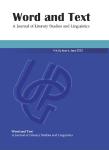 Afişare bibliotecă documente
Afişare bibliotecă documente
WT 2-2012 Place of Translation
| Nume | Mărime |
|---|---|
 Cuprins Cuprins | 13,1k |
 coperta interioara coperta interioara | 119,9k |
 Glocal Identities in Translation Glocal Identities in Translation | 151,7k |
 introduction introduction | 68,1k |
 Translating Place - Linguistic Variation in Translation Translating Place - Linguistic Variation in Translation | 296,4k |
 Editor de active
Editor de active
 webPDFFile
webPDFFile
File having the role webPDF
 webPDFFile
webPDFFile
File having the role webPDF
 webPDFFile
webPDFFile
File having the role webPDF
 webPDFFile
webPDFFile
File having the role webPDF
 Rezumat
Rezumat
CALL FOR PAPERS 1/2012
POSTCOMMUNISM- POSTCOLONIALISM'S OTHER
If Postcommunism designates the period of political and economic transition from communism to democracy after the dramatic events of 1989 (the fall of the Berlin Wall, the Velvet Revolution in Prague and the Romanian revolution, to name but a few) period which was dominated by the rejection of Soviet communism legacies and associated institutions, symbols, vocabularies, socialist realism, postcolonialism is rooted in capitalist ideology.
Despite Derrida's timely Specters of Marx and the spate of critical activity that it generated, as well as Stéphane Courtois' The Black Book of Communism, whose responses varied from highly enthusiastic support to bitter criticism, and Eric Hobsbawn's or Vladimir Tismăneanu's accounts on an epoch that was to leave permanent traces in world history, out of all post's, postcommunism as such has not received the theoretical attention it would have otherwise deserved. Meant to go beyond communism's blurring of all differences and equalitarianism, postcommunism attempted to meet postcolonialism in precisely that point where it (de)constructs the Other through a politics of difference. Postcommunist countries felt both European and in the periphery of it and have been aware of having awaken to capitalism somewhat too lateand somewhat embedded in a reservoir of what the Westerners perceive as lacks of civilization.
This issue invites contributions on considering postcommunism postcolonialism's other, extending the concept of 'otherness' from the strictly philosophical meaning conceived by Hegel in his famous parable of the master-slave dialectic, and later made much more popular by Levinas' "infinite other" or Lacan's articulating the other with symbolic order to othering as the unconscious (Freud), the silent, the unsaid, insanity (Blanchot) to the political, social, cultural other, the other of language.
Prompting contributors to engage their own colonized otherness, the issue seeks contributions that will broaden our understanding of cultures of post-Communist societies through a variety of cultural and literary theories that proved to be of particular relevance to the study of the contemporary age (post-modernism, post-colonial theory, diaspora and globalisation.) The issue will attempt to rekindle the militant relevance and political involvement of cultural studies in the new context of postcommunist Europe from a range of perspectives that include (but are not limited to):
· Marginalized cultures
· Cultures of lies
· Looking Westwards since 1989
· Tradition, nostalgia and belated communism in post 1989 national identities
· Cultural Diaspora and de-territorialization
· Cultural contradictions of post-communism
· Derrida's Reflections on Post1989 Europe (The Other Heading)
· Postcommunist literatures
· The emergence of new linguistic and discursive paradigms
· Postcommunism in translation
· Postcommunism in the West: around Le retour de Marx
We welcome interdisciplinary approaches, ranging across critical theory, literary studies, cultural studies, general and applied linguistics as well as other disciplines in the humanities. Contributors are advised to follow the journal's submission guidelines and stylesheet. The deadline for article submissions is 15 April 2012. The articles should be sent to as attachments to: wordandtext2011@gmail.com. All submitted articles will be peer-reviewed. Accepted articles will be returned for post-review revisions by 1 May and are expected back in their final version by 7 May.
 Despre
Despre
Word and Text
A Journal of Literary Studies and Linguistics (ISSN 2069-9271), formerly entitled Buletinul Universităţii Petrol-Gaze din Ploieşti, Seria Filologie, is a bi-annual peer-reviewed international journal in critical theory and linguistics. It publishes essays and reviews in English and French which explore general critical theory and its application to literature, as well as general and applied linguistics. Word and Text - A Journal of Literary Studies and Linguistics publishes critical work by established scholars and postgraduates ranging across critical theory, literary criticism and cultural studies, general and applied linguistics.
 About the Journal
About the Journal coperta II
coperta II









